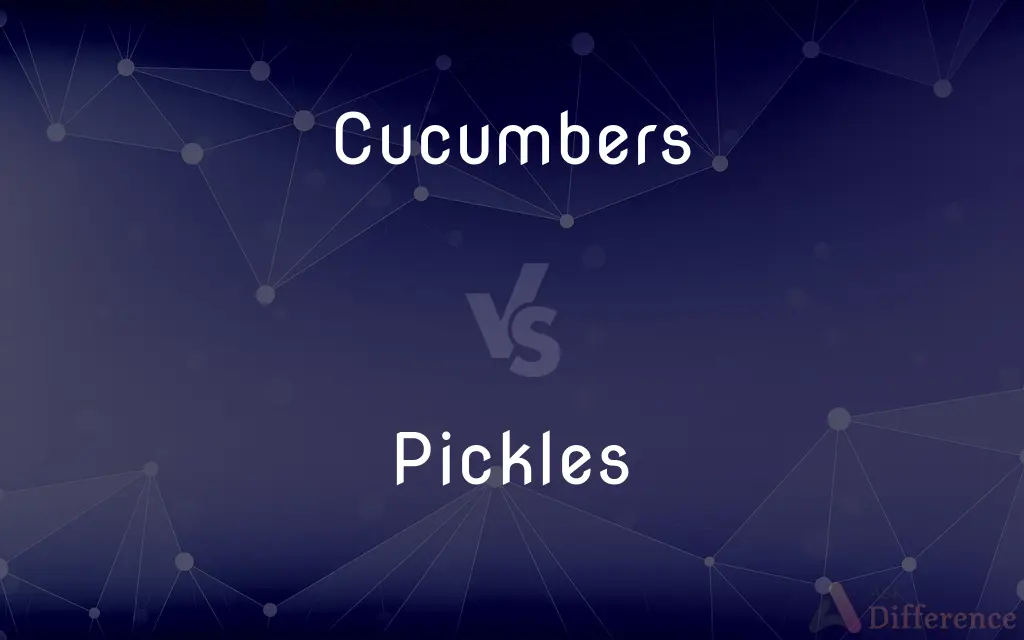Cucumbers vs. Pickles — What's the Difference?
By Tayyaba Rehman & Fiza Rafique — Published on October 31, 2024
Cucumbers are fresh, crisp vegetables high in water content, while pickles are cucumbers that have been preserved in a solution of vinegar or brine, often with added spices, resulting in a tangy or sour taste.

Difference Between Cucumbers and Pickles
Table of Contents
ADVERTISEMENT
Key Differences
Cucumbers are a popular vegetable, known for their mild, refreshing taste and high water content, making them a favorite in salads, sandwiches, and as hydrating snacks. They are low in calories and contain important vitamins and minerals, such as vitamin K, which is essential for blood clotting and bone health.
Pickles, on the other hand, which are cucumbers that have undergone the fermentation or pickling process, offer a tangy or sour flavor that complements a variety of dishes. The pickling process not only extends the shelf life of cucumbers but also can add nutritional value, such as probiotics in fermented pickles, which are beneficial for digestive health.
Both cucumbers and pickles come from the same base vegetable, while their nutritional profiles change through the pickling process. Pickles may contain added sugars and salts, which can increase their sodium and calorie content, potentially making them less suitable for individuals monitoring their salt intake. However, the vinegar in pickles can provide some health benefits, including improved sugar control and increased absorption of certain minerals.
In terms of culinary uses, cucumbers are versatile, used both in fresh applications and cooked dishes, whereas pickles are typically used as a condiment or side dish, adding flavor to sandwiches, burgers, and salads. The choice between cucumbers and pickles may depend on the dietary needs, taste preferences, and the specific requirements of a recipe.
Despite their differences, cucumbers and pickles share a place in many cuisines around the world, celebrated for their distinct textures and flavors. Whether enjoyed fresh or preserved, they contribute to a balanced diet, offering a range of nutrients and benefits that cater to various tastes and dietary needs.
ADVERTISEMENT
Comparison Chart
Base Ingredient
Fresh vegetable
Fermented or brined cucumber
Taste
Mild, refreshing
Tangy, sour
Nutritional Value
High in water, vitamin K
May include probiotics, higher sodium
Culinary Uses
Salads, sandwiches, snacks
Condiments, side dishes
Shelf Life
Short, requires refrigeration
Extended through preservation
Health Benefits
Hydration, low calories
Digestive health (probiotics), extended nutrient retention
Compare with Definitions
Cucumbers
A green, hydrating vegetable often eaten raw.
She added sliced cucumbers to her salad for a refreshing crunch.
Pickles
Can be made through fermentation, offering probiotic benefits.
Fermented pickles contribute to a healthy gut microbiome.
Cucumbers
Known for its mild flavor and high water content.
Cucumbers are great for hydration on hot summer days.
Pickles
Cucumbers preserved in vinegar or brine, often with spices.
He topped his burger with a slice of dill pickle.
Cucumbers
Used in beauty treatments for its soothing properties.
He placed cucumber slices over his eyes to reduce puffiness.
Pickles
Have a tangy or sour taste, enhancing the flavor of dishes.
She loves the tangy crunch of pickles in her sandwiches.
Cucumbers
Can be grown in gardens and containers.
Their backyard garden boasts a prolific cucumber vine.
Pickles
The pickling process extends the shelf life of cucumbers.
They made jars of pickles to preserve their cucumber harvest.
Cucumbers
Low in calories, making it a popular choice for weight management.
She snacks on cucumbers to stay full while dieting.
Pickles
A staple in many cuisines, adding zest to meals.
Pickles are an essential side dish in traditional Korean meals.
Cucumbers
A tendril-bearing, climbing or sprawling annual plant (Cucumis sativus) widely cultivated for its edible cylindrical fruit that has a green rind and crisp white flesh.
Pickles
An edible product, such as a cucumber, that has been preserved and flavored in a solution of brine or vinegar.
Cucumbers
The fruit of this plant, harvested when immature and eaten fresh or pickled.
Pickles
A solution of brine or vinegar, often spiced, for preserving and flavoring food.
Cucumbers
Any of several related or similar plants, such as the bur cucumber or the squirting cucumber.
Pickles
To preserve or flavor (food) in a solution of brine or vinegar.
Cucumbers
Plural of cucumber
Pickles
Plural of pickle
Common Curiosities
Are pickles as healthy as cucumbers?
Pickles can be healthy, especially if fermented, but often have added salt, making cucumbers a better option for low-sodium diets.
Why do pickles last longer than cucumbers?
The vinegar or brine solution in pickles acts as a preservative, extending their shelf life significantly compared to fresh cucumbers.
Are cucumbers or pickles better for weight loss?
Cucumbers, being low in calories and high in water, are typically better for weight loss.
Can you pickle cucumbers at home?
Yes, cucumbers can easily be pickled at home using vinegar or a saltwater brine, along with preferred spices.
Can cucumbers and pickles be used interchangeably in recipes?
They are not typically interchangeable due to their different flavors and textures; pickles add a tangy element, while cucumbers add freshness.
Why are pickles often served with sandwiches?
The tangy flavor of pickles complements the richness of meats and cheeses, enhancing the overall taste of sandwiches.
Can eating pickles help with digestion?
Yes, fermented pickles contain probiotics that support digestive health.
Is the texture of cucumbers and pickles different?
Yes, cucumbers are crisp and fresh, while pickles have a softer texture due to the pickling process.
Do pickles contain any vitamins or minerals?
Yes, pickles retain some of the vitamins and minerals from cucumbers but also contain vitamins and minerals from the pickling ingredients.
How do cucumbers contribute to hydration?
Their high water content makes them an excellent food for staying hydrated, especially in warm weather.
Are all pickles made from cucumbers?
While cucumbers are the most common base, other vegetables can also be pickled.
Can consuming too many pickles be harmful?
Due to their high sodium content, consuming pickles in moderation is advised, especially for individuals with hypertension.
Do cucumbers lose nutrients when pickled?
Some water-soluble vitamins may be lost, but pickling can also add nutrients from the brine or fermentation process.
What's the difference between dill and sweet pickles?
Dill pickles are made with dill and garlic for a tangy flavor, while sweet pickles include sugar or sweeteners for a sweet taste.
How should cucumbers and pickles be stored?
Cucumbers should be refrigerated and used quickly, while pickles should be kept in their brine or vinegar solution and can be stored longer.
Share Your Discovery

Previous Comparison
Exergonic Reaction vs. Endergonic Reaction
Next Comparison
Strong AI vs. Weak AIAuthor Spotlight
Written by
Tayyaba RehmanTayyaba Rehman is a distinguished writer, currently serving as a primary contributor to askdifference.com. As a researcher in semantics and etymology, Tayyaba's passion for the complexity of languages and their distinctions has found a perfect home on the platform. Tayyaba delves into the intricacies of language, distinguishing between commonly confused words and phrases, thereby providing clarity for readers worldwide.
Co-written by
Fiza RafiqueFiza Rafique is a skilled content writer at AskDifference.com, where she meticulously refines and enhances written pieces. Drawing from her vast editorial expertise, Fiza ensures clarity, accuracy, and precision in every article. Passionate about language, she continually seeks to elevate the quality of content for readers worldwide.













































